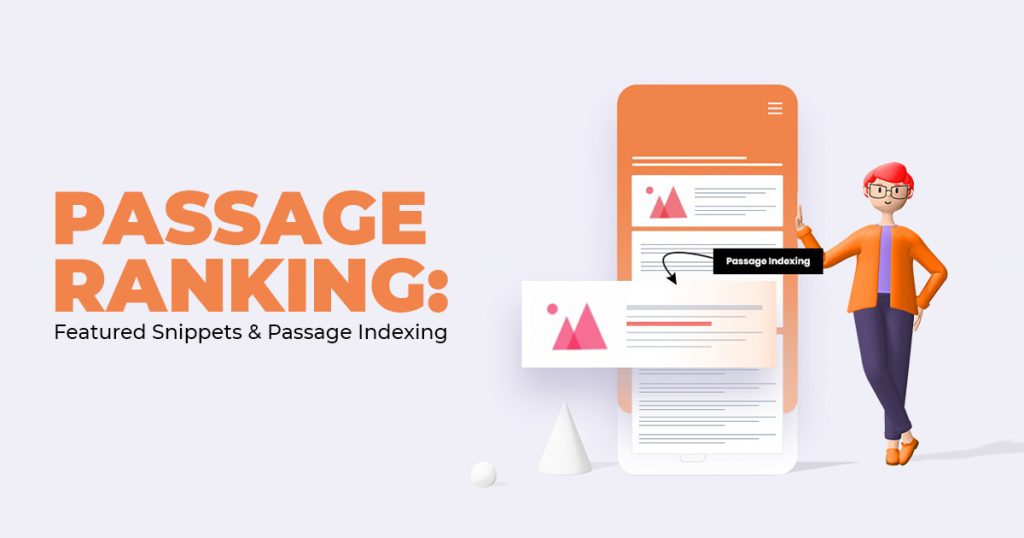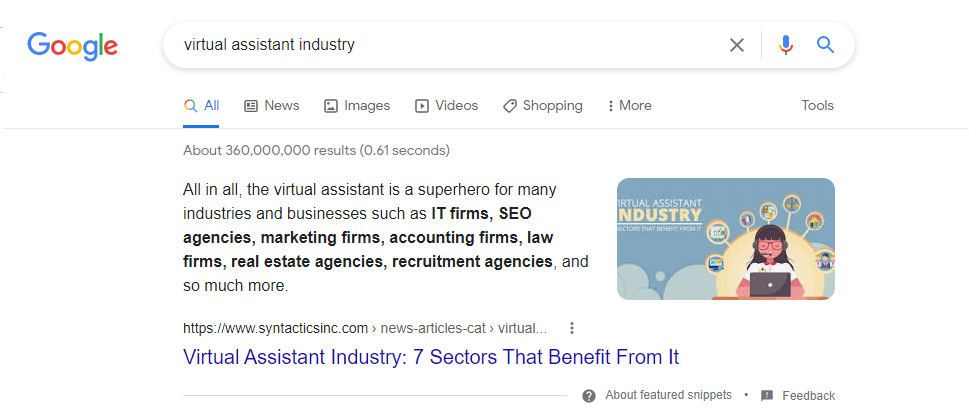
Passage Ranking: Featured Snippets and Passage Indexing
To gain organic traffic, you need to apply Content Optimization. With Google Passage Indexing or Google Passage Ranking, even small chunks of text in your content can rank. Of course, the content should be valuable to searchers first. However, Google also has Featured Snippets, which also help parts of your optimized content rank.
Search Engine Results Pages to drive traffic to your site. SEO-savvy businesses of any industry are vying for the #1 spot on Search Engine Results Pages. Featured Snippets are unique in that a chunk of information shows up on the results page.
Of course, both optimize passages for Search Engines. As a result, particular pieces of information appear in SERPs. Content Optimization is valuable to your SEO strategies. So let’s break down Featured Snippets and Passage Indexing.
Optimizing content for Google’s Featured Snippets
Source: Google.
You may have already seen Featured Snippets if you’ve looked anything up lately. Featured Snippets are those boxes that sit at the top spot of Search Engine Results Pages. Each has a choice paragraph of text relating to the search. Thus, each Featured Snippet provides vital information while linking back to the original text.
Of course, featured snippets are related to rankings. They’re answers that are taken from existing pages. Because of their nature and placement, they’re a prime method for giving Google users answers directly from the search page.
When Google identifies a relevant passage or piece of info about a topic, it turns that piece into a Featured Snippet. Because Google understands its relevance to a query, the passage will appear on the SERP itself.
See, Featured Snippets appear above organic search results. However, Featured Snippets will show up beneath paid results, if there are any. As a result, Featured Snippets are at “position 0” as it’s not infringing on the organic rankings.
 Types of Featured Snippets
Types of Featured Snippets
Featured Snippets contain optimized passages that have ranked high enough for Google’s search engines. However, if you have Long-form Content, you have a bigger chance to rank various passages.
You need to think of user experience and apply Content Optimization. So, here are its varied types, according to Search Engine Journal:
Paragraphs.
This type of Featured Snippet involves a text passage from web content. It answers a query immediately. Also, a Paragraph Featured Snippet entices the searcher to follow the information to the original page.
Numbered lists.
This Featured Snippet has a numbered list of instructions. Considering its step-by-step approach, it’s best for recipes. Also, tutorials such as managing duplicate Google My Business listings are popular with this type.
Bulleted lists.
Bulleted List Featured Snippets share information that’s not in a sequence. However, it’s excellent for rankings and lists. For example, you could ask, “What questions should I ask when hiring an SEO consultant?” and see a relevant list.
Tables.
Table Featured Snippets, of course, show off statistics. However, through the nature of Featured Snippets, searchers can see the information they need front and center.
YouTube.
Google can pull either description text or clips from a YouTube video. So, Video Marketers need to anticipate and prepare for YouTube Featured Snippets.
Carousel.
While not as prominent as others on the list, the Carousel Featured Snippets refer to tiny bubbles containing related keywords. Click on a bubble, and the SERP changes accordingly! (Of course, the results pages here may also have ranked passages.)
Double.
The Double Featured Snippet shows up if Google is unsure about the meaning of the user’s search intent and keywords used. So, it shows two snippet picks in case one doesn’t contain the answer according to searcher intent.
Two-for-One.
This Featured Snippet type combines two different sources. After all, there’s a lot of information on the Internet nowadays. So, Google might provide a snippet with text from one website and an image from another.
How to optimize and rank on Featured Snippets: A Quick Guide
Much work goes into securing a spot on the first page of Google’s search results. However, achieving the coveted #1 spot raises the difficulty. Part of reaching it involves webpage Content Optimization. First, you need to optimize things like your Meta Descriptions and Title Tags.
But, Featured Snippets can significantly boost your visibility. You’ll want to learn how to rank for Featured Snippets. Here’s how you can accomplish that:
Research on and choose the best possible keywords.
Featured Snippets are all about the keywords! So when doing keyword research, you’ve got to focus on search queries that come in question form. After all, Featured Snippets answer questions!
So, find crucial keywords and make them into questions your audience will ask. Plus, you can check the results from the “People also ask” box for more ideas to better optimize your content for a chance at ranking for Featured Snippets.
Have excellent passages content to rank.
Of course, for your passage to rank high at the top of Google’s SERPs, you’ll need to offer helpful information. And don’t forget to apply the Inverted Pyramid style to that chunk of content!
Once you’ve got your Expert, Authoritative, and Trustworthy content going, you’ll have no issue getting noticed by search engines. Generally, Featured Snippets follow an optimal word count of around 40 to 50 words. However, some have about 58 words.
Don’t sleep on formatting and structure.
Depending on the type of Featured Snippets you’re attempting to rank, you’ll have to format your content accordingly, such as with a Table Featured Snippet.
The same goes for List Featured Snippets! For those, it’s best to keep sentences short yet charged with meaning. However, this tip also involves the entire page or the content itself. So, again, formatting your content with headers helps search engines make sense of the content structure.
One last pro tip: it’s best to use landscape-oriented images!
Images are essential for optimizing Featured Snippets too! Images will, of course, lend a visual element to Google’s answers. However, sometimes, the image on the Featured Snippet doesn’t come from the same page.
So, ensure that your pictures accompany your Featured Snippets content by keeping them landscape-oriented. Alt text can also help with this.
And that ends this quick guide! Follow these tips, and you’ll get your content on those SERPs!
Google Passage Indexing (or Passage Ranking)
If you’ve seen our article on 2022’s SEO Trends, you might already be familiar with Passage Indexing. Some searches can yield results that don’t answer a Google user’s question.
A sentence containing the desired answer is sometimes hidden in an article that may not match the topic. This is because Google’s natural language processing feature checks content. It will then search for content relevant to the search queries.
When writing longer-form content, sometimes you include subtopics related to the main one. So a passage or small chunk of your content may contain information about a subtopic. As a result, that chunk can get on the right SERPs because of Passage Indexing.
As a result, Passage Indexing can find topics in content — even if they’re not the main focus. Thus, related content ranks on the right SERPs. So Passage Indexing doesn’t answer a specific question.
Important Side Note:
Before continuing with Content Optimization for passages, just know that Google’s Passage Indexing isn’t actually indexing. Instead, it’s more of a ranking thing.
Of course, Google’s indexing process hasn’t changed — the entire webpage will be indexed as usual. So, the more concise term is Passage Ranking. Still, the generally-accepted term is Passage Indexing. But the bottom line is that Passage Ranking can help you find that needle in a haystack, or rather, the search term on the ‘Net.
Passage Indexing versus Featured Snippets
Let’s say you need to find the species of a particular animal. There’s a page containing various details about that animal. Featured Snippets will tell you about the species straight away on the SERP.
Passage Indexing means that a passage is more relevant to a search query than its main topic. Thus, that passage is on the appropriate SERP. So, the related chunk or piece of content will show up at the top of organic search results!
Let’s say you’re asking Google, “How can I set up ads on Linkedin?” If Google can answer that question, then a Featured Snippet might show up in the SERP. However, in terms of Passage Indexing, Google won’t show passages because there may already be a decent amount of content to answer your question.
Passage ranking helps your content reach more Google users!
Google optimizing passages for search engines means that it acknowledges that your content is valuable to its users. As a result, the content passages are relevant in the right SERPs.
So, Passage Indexing finds even useful chunks of text from content on the ‘Net and makes sure they’re on the right results pages. On the other hand, Featured Snippets get the essential part of the text to answer a query quickly. In sum, both are significant in getting ahead of your competitors.
Both Featured Snippets and Passage Indexing are crucial for getting your content noticed by search engines and searchers. In addition, your content gets on the right results pages by optimizing specific passages for search engines.
Of course, you can count on Google to index passages and get them on SERPs. However, you’ll have to put in a fair bit of effort so that the search engines can pick up passages in your content. So, you can always count on SEO Services in the Philippines for content optimization!




















Comment 0